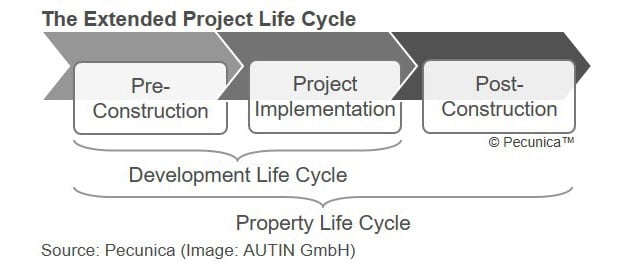What is Hotel Development?
The Hotel Project Life Cycle
Property development is the development of real estate. The property development life cycle starts with the launch of a development project and ends with project exit and usually the sale of the property by the developer.

The property life cycle covers the entire life cycle of a property, from its development until the end of its economic useful life, including its operation:
- Pre-construction- Conceptual planning, feasibility studies, operator selection, land acquisition, and entitlements;
- Project construction- Execution of the project strategy, selection of the professional services and consultants by the developer for project implementation and realization; and
- Post-construction- Operation and maintenance of facilities upon construction completion, commonly marking the developer's exit from the project.
The hotel project life cycle is the time span and the phases of a hotel development project, from its original idea through to developer project exit and property operation. It defines the interrelated project development phases and final delivery of the facilities to its operator and asset manager.
Alternatively, the life cycle of a hotel development project can be distinguished in more granular and sequential phases that parallel the project value chain. The value chain follows a property's life cycle and describes the activities in the production process that are needed to deliver a product and the points in the process where value is created.
To perform the various activities during the property's extended life cycle, the roles and responsibilities are assumed or assigned by the developer to the different stakeholders in each phase of the development project. The appropriate level of integration depends on the respective stakeholder's position and function in the development process.
Hotel sustainability boosts profit margins throughout the hotel project life cycle for all stakeholders. Benefit and profit are realized through utility savings, future-proof investment strategies, meeting consumer preferences, and regulatory incentives.
Hotel Property Development
Hotel development can refer to either hotel business development or hotel property development, but often both as interconnected requirements. The full spectrum of hotel development starts with strategic business management and ends with the final disposition and transfer of a newly built hotel to the operator.

Hotel business development is the process of pursuing an organization's strategic objectives and expanding the organization's market exposure. This can be achieved through organizational mergers, existing hotel property purchases, marketing, branding and business repositioning, hotel extensions and new-builds.
Hotel property development is the real estate development process that brings an idea or concept for a hotel with the associated hospitality services to successful realization through project construction. As with any property development project, it is an interdisciplinary, complex business process that encompasses the complete economic and physical life cycle of developed real estate.
Property development can be viewed holistically as the delivery of complete solutions for real estate space, from project concept and implementation to the operation and disposition of the developed property. It results in new builds and refits, including the renovation, rehabilitation and reconstruction, and re-lease of the constructed buildings.
Property development requires the skills and expertise of numerous professionals and service providers. It calls on the developer to assemble a team of professionals to address the various economic, physical, environmental and political issues inherent in a project.
Integrated development involves the project developer acting in various professional capacities throughout the project development phases. It results in the developer gaining benefit along the value chain.
Sustainable development calls for all stakeholders to understand and adopt sustainability principles along a property's life cycle.
Sustainable development is the principled use of environmental resources to ensure long-term, viable economic operations that provide socio-economic benefits to all project stakeholders, without compromising the opportunity of future generations to meet their own needs.